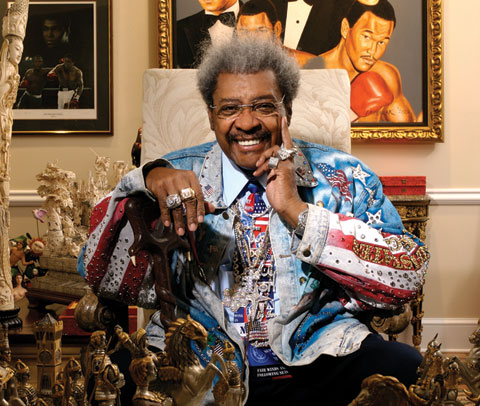A conversation with Don King is laden with lessons that take a lifetime to amass. Whether said conversation takes place inside his beautiful-and beautifully ornate-mansion on the sands of Manalapan, Florida, as ours did, or in the desert sands of Iraq (where he just returned from a second good will trip), one walks away from Don King with a finer knowledge of the past of this great nation of ours. This is a man who, while rooted in history, is rooting for the betterment of the American people as a whole in the future. And it doesn’t matter which person-black, white, brown, or yellow-King wants everyone to work together to create the unique brand of unity that is found “Only in America.”
These truths come pouring out of the legendary boxing promoter on a sunny Florida day in mid-December. We had the pleasure of joining Don King at his estate just one week before Christmas, and at the end of the day, our appreciation for all things U.S.A. was so enhanced, there was a strong desire to pick up an American flag and start waving it about, a desire that must be contagious when one is around Don King, evidenced by the countless images he shared with us during our tenure in his presence.
“Money ain’t worth having if you have to trade your money for your character and your integrity and your honor; you don’t need that.”
Don King. We say Don King because that is how he continuously refers to others: using their full names. Whether speaking about Frederick Douglas, Aretha Franklin, or George Walker Bush, Don King time and again uses their full names: perhaps a result of a lifelong career as a boxing promoter, or his admirable thoroughness and attention to detail.
And thorough he is. He leaves virtually no stone unturned, no subject uncovered, when discussing what is important to him, from his rock and roll beginnings at his nightclub, Corner Tavern, which has hosted all of the greats, to his promoting career, where, likewise, he has worked with every great name that ascended through the sport. He credits his successes all back to his lovely and loving wife, Henrietta. “Nothing in my life is more important to me than her… She’s there with the best of them, the sorrow, the trials and tribulations, you know, and there’s the essence of what life is really about, you know. L-O-V-E.”
And there, just minutes into our conversation, is our first Don King-ism, a series of words that are profound, simple, heartfelt, and real. It seems merely seconds before he spouts another one, this about his philanthropy: “The highest form of charity is opportunity.” He then cites The Bible. References John Fitzgerald Kennedy. Quotes Susan B. Anthony. It doesn’t take long to realize that this man, a pop-icon for decades, really is the larger-than-life character who one has seen on the television screen, promoting more than 500 fights throughout his boxing career, which began with a philanthropic request for Muhammad Ali.
Don King, born in Cleveland, Ohio, in 1931, is extremely loyal to his roots, and so when a hospital in his hometown was facing financial doom, he convinced Muhammad Ali to support a fundraising benefit. The two clicked, and boxing has never been the same, because, as the Don King-ism goes, “In a thousand ways, one man can make a difference.”
And throughout his long career, Don King has made a significant impact on the sport of boxing, but also on the lives of those boxers: Ninety-three boxers have earned $1 million or more under on King Productions-promoted events. On Don King’s watch, the first Mike Tyson vs. Evander Holyfield fight was seen by more than two billion people. And the famed “Rumble in the Jungle,” the tussle between Muhammad Ali and George Foreman that went down in Zaire? Don King was behind that one, too. In 1981, he became the first promoter to guarantee a fighter-in this case Sugar Ray Leonard-a $10 million purse.
But he is quick to dismiss the monetary value: “Money ain’t worth having if you have to trade your money for your character and your integrity and your honor; you don’t need that. If you can maneuver around to keep them both, great, but don’t sell your soul. The Bible says, ‘What good is it to gain the whole world and lose your soul?’ Don’t trade it in, take them both. Get the money and keep your reputation and your honor, then it has a lasting affect. But when you don’t have your honor, you are not going to make it.”
Don King has had the ability to keep both. His massive oceanfront property in Manalapan (complete with a replica of the Statue of Liberty facing the Atlantic), is filled with priceless artwork and books that are the manifestations of his hard work. Even Forbes magazine has said, “Cash is part of the King persona,” but it hasn’t always been so. His youth was hard and many of his lessons were learned while hustling on the streets. “I’m not a graduate of Yale, Princeton, Cambridge, Harvard, or Oxford,” he says. “I graduated from the University of Hard Knocks, and I graduated summa cum laude.”
While that Don King-ism may be a little over-the-top, so is Don King, right on down to the electrified hair and jewel-studded American flag jean jacket, a Don King wardrobe staple. He wore it throughout his recent tour of Iraq, where his belief in the spirit of the American soldier was further cemented.
“I have the utmost respect for the men and women of our armed services. They pay the ultimate sacrafice in laying down their lives to protect our lives and the freedoms and liberties we enjoy. Nothing is too good for them and nothing we can do is enough. When I visited Iraq over Thanksgiving I was so impressed by these young men and women. Their character and their dedication and commitment is so inspiring. It just filled my heart with pride to stand side by side with these servicemen and women in camp warhorse in southern iraq as we saluted the flag. It was a tremendous experience and one I shall always remember.”
Don King lives for this country
He breathes for it and fights for it every day, as evidenced by his support of organizations like the NAACP, the United Negro College Fund, the Martin Luther King Jr. Foundation, the Simon Wiesenthal Center, National Hispanic Scholarship Fund, National Coalition of Title 1/Chapter 1 Parents, and so on. He states, “It’s so fundamentally important that we recognize that we have the greatest nation in the world, and that we work toward the betterment of this nation by appreciating those who are different from us in the pigmentation of their skin, but who would judge us in content and in character of heart.”
And as one of America’s biggest advocates, he is a huge supporter for the country’s controversial commander in chief, which he explains, of course, with a historical quote. “Shakespeare said, ‘To thine own self be true.’ If [people are] true to themselves, they would join me in celebrating George Walker Bush as one of the greatest presidents we’ve ever had, not from the battlefront or academic recognition, but from the heartfelt association with the masses of the people in America.” George Walker Bush’s often-used word that has struck a cord with Don King? Inclusive. Being that Don King is a constant advocate for a society where everyone is treated equally, the president’s message corresponds with Don King’s, and so during the presidential campaigns, Don King toured to raise support for George Walker Bush from the minority voters.
He also campaigns to give the minority a voice. In 1998, he bought Cleveland newspaper Call & Post, which he describes as “the paper for the black community in Ohio.” He obviously has a thing for the demographic dissemination of information: He is launching www.DonKingNetworkTV.com by the end of 2007. He explains, “I want to bring a network where I can give all the people a platform to speak their voice,” which fits in with the idea of inclusiveness that pervades every aspect of his being. “I want to open the door to the mass public-whatever they want to do, they want to talk about baby stories, whatever they want to do, because it’s going to be a democratic process. … Just as I live my life, I’m a people person. I’m a promoter of the people, for the people, and by the people, and my magic lies in my people ties, so I am going to be a television entrepreneur of the people, for the people, by the people, and the magic will lie in my people ties.”
He continuously speaks in this descriptive and self-righteous prose that is indicative of a knowledge of the intricacies of both his past and the collective past of this country and the world beyond. For example, in one long, Don King-ism, he cites Jesus, Confucius, and the great general Sun Tzu, who said, according to King, “You create havoc in the West, you strike in the East.” This sounds a tad like the Muhammad Ali saying, “Float like a butterfly, sting like a bee.” Don King is a man so rooted in the world of fighting, he can’t help but make connections; even his multimillion-dollar art collection is reflective of it, as he collects works from places that were battlefronts.
His life is a constant battle, or at least is always about the next joust, which in this case, is the January 19 bout between Felix Trinidad and Roy Jones Jr., which Don King is lauding as “The biggest event of alllll time” on his website, www.DonKing.com. He is even comparing it to the Rumble in the Jungle. “It is ‘Bring on the Titans!’ in Madison Square Garden,” he says.
And Don King, without a doubt, is the greatest titan of them all. Overcoming adversity to be the face of boxing, Don King is the American Dream.
As he says, “Still standing. I’ve been born, shot, stabbed, bowed up; It’s unbelievable, but I am still standing.” Surely, we can expect to see many more great things come from Don King’s corner.





















